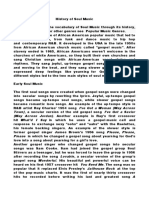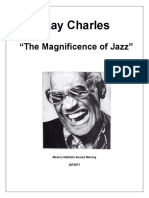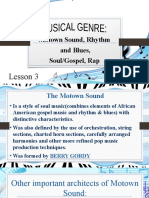Soul music (often referred to simply as soul) is a popular music genre that originated in the African
American community throughout the United States in the 1950s and early 1960s. It combines elements
of African-American gospel music, rhythm and blues and jazz. Soul music became popular for dancing
and listening in the United States, where record labels such as Motown, Atlantic and Stax were
influential during the Civil Rights Movement. Soul also became popular around the world, directly
influencing rock music and the music of Africa.[1]
According to the Rock and Roll Hall of Fame, soul is "music that arose out of the black experience in
America through the transmutation of gospel and rhythm & blues into a form of funky, secular
testifying".[2] Catchy rhythms, stressed by handclaps and extemporaneous body moves, are an
important feature of soul music. Other characteristics are a call and response between the lead vocalist
and the chorus and an especially tense vocal sound.[3] The style also occasionally uses improvisational
additions, twirls and auxiliary sounds.[3] Soul music reflected the African-American identity and it
stressed the importance of an African-American culture. The new-found African-American consciousness
led to new styles of music, which boasted pride in being black.[4]
Soul music has its roots in traditional African-American gospel music and rhythm and blues and as the
hybridization of their respective religious and secular styles – in both lyrical content and instrumentation
– that began in the 1950s. The term "soul" had been used among African-American musicians to
emphasize the feeling of being an African-American in the United States.[6] According to musicologist
Barry Hansen,[7]
Though this hybrid produced a clutch of hits in the R&B market in the early 1950s, only the most
adventurous white fans felt its impact at the time; the rest had to wait for the coming of soul music in
the 1960s to feel the rush of rock and roll sung gospel-style.
James Brown was known as the "Godfather of Soul"[8]
According to AllMusic, "[s]oul music was the result of the urbanization and commercialization of rhythm
and blues in the '60s."[9] The phrase "soul music" itself, referring to gospel-style music with secular
lyrics, was first attested in 1961.[10] The term "soul" in African-American parlance has connotations of
African-American pride and culture. Gospel groups in the 1940s and '50s occasionally used the term as
part of their names. The jazz style that originated from gospel became known as soul jazz. As singers and
arrangers began using techniques from both gospel and soul jazz in African-American popular music
during the 1960s, soul music gradually functioned as an umbrella term for the African-American popular
music at the time.[11][12]
Important innovators whose recordings in the 1950s contributed to the emergence of soul music
included Clyde McPhatter, Hank Ballard, and Etta James.[7] Ray Charles is often cited as popularizing the
soul music genre with his series of hits, starting with 1954's "I Got a Woman".[14] Singer Bobby Womack
�said, "Ray was the genius. He turned the world onto soul music."[5] Charles was open in acknowledging
the influence of Pilgrim Travelers vocalist Jesse Whitaker on his singing style.
Little Richard, who inspired Otis Redding,[15] and James Brown both were equally influential. Brown was
nicknamed the "Godfather of Soul Music",[8] and Richard proclaimed himself as the "King of Rockin' and
Rollin', Rhythm and Blues Soulin'", because his music embodied elements of all three, and since he
inspired artists in all three genres.[16]
Sam Cooke and Jackie Wilson also are often acknowledged as soul forefathers.[5][17] Cooke became
popular as the lead singer of the gospel group The Soul Stirrers, before controversially moving into
secular music. His recording of "You Send Me" in 1957 launched a successful pop music career.
Furthermore, his 1962 recording of "Bring It On Home To Me" has been described as "perhaps the first
record to define the soul experience".[18] Jackie Wilson, a contemporary of both Cooke and James
Brown, also achieved crossover success, especially with his 1957 hit "Reet Petite". He even was
particularly influential for his dramatic delivery and performances.[19]
























































































